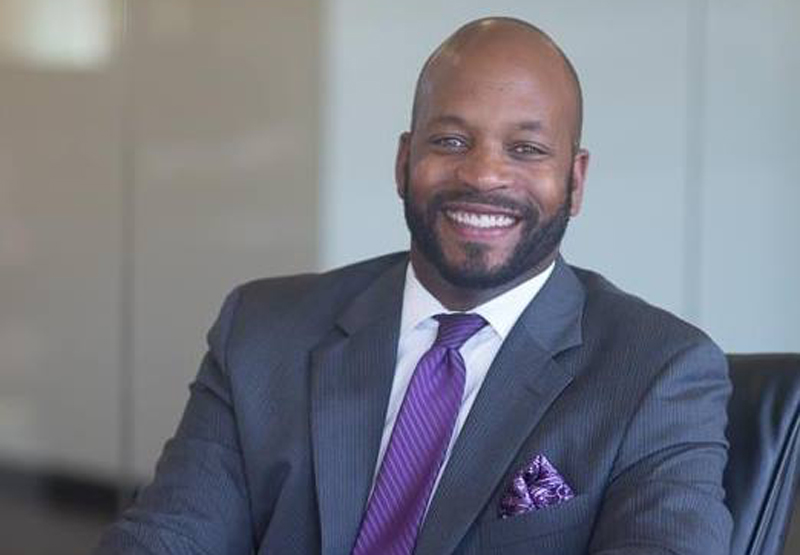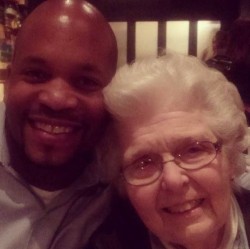
By Edward Henderson
One of the luxuries of youth is every day seems like a fairy tale. The ills of the world surrounding race, class and gender mean nothing. All you want to do is have fun. Suddenly, you’re exposed to the chaos of the times and you’re faced with a choice. Let yourself be consumed by ignorance or transcend the limitations others project on you. Omar Passons chose the latter. Placed into the foster system as an infant, Passons grew up in a home with white parents and a revolving door of over 100 other Black and Latino children. Cultural differences, disconnection with his birth parents and harsh reactions to his living situation couldn’t stop him from growing into a man of purpose and vision.
Growing Up Fostered
 Passons, 40, was adopted into his foster home at the age of six. His parents were both high school dropouts and didn’t come from money. However, his mother was very open to assisting as many children as she could.
Passons, 40, was adopted into his foster home at the age of six. His parents were both high school dropouts and didn’t come from money. However, his mother was very open to assisting as many children as she could.
“My mom was cursed with having too big of a heart,” Passons said. “She would always do for others when she didn’t have much for herself.”
Many of the children the family would take in had serious medical issues. Passons recalled one of his brothers suffered from third degree burns over his entire body after his birth mother’s boyfriend poured boiling water on him.
“When you’re a kid and you see somebody who’s really deformed it’s a little frightening. But it shaped me not to have negative views of people who were different.”
Passons’ childhood in the home was a positive one and it wasn’t until elementary school that he began to realize his living situation wasn’t like others around him.
“I would start having friends come over, their eyes would bug out,” Passons said. “When I could see in them that what was going on in my house wasn’t like in any other house was a big shift.”
The cultural differences of growing up with white parents began to stand out amongst his peers. Passons’ lack of knowledge surrounding hair and skin care were made painfully apparent by other students teasing him mercilessly.
“If you looked at pictures of me up until 9th grade my hair was a mess. People were not kind … I learned about what ashy was not from my parents but from a friend picking on me in middle school.”
It was clear to Passons that he would need to do some research into his past and find out what blackness would mean to him.
Connecting With the Past
Passons spent time with older black foster brothers and sisters that came through the home to learn more with his culture. Many spent some time growing up with their black birth parents before entering the system. When the family moved to Arizona, Passons experienced first piece of racial prejudice.
“It was the first time anybody ever used the ‘N word’ towards me. That started to get me to think a little bit more and read a little more,” Passons said.
The Autobiography of Malcolm X was one of the first books he was directed to. Passons also did a paper on Oprah’s life for a class assignment that continued to spark his interest. The family moved back to San Diego when Passons was 17 to a home on the corner of Skyline and Lemon Grove. By that time Passons felt confident and secure within his culture.
The next step for Passons was to find out more about his birth parents and extended family. After some research, he found out he had a large extended family rooted in Arkansas including a sister. His biological mother was deaf and grew up in the segregated south. She ran away at 14 because of abuse and had four children over a nine year span. None of the fathers are connected to their children. Learning about his mother’s story gave Passons’ life a new direction.
“When I connected with my mother I found out she was homeless in the streets of San Diego for a short time when I was young after she lost me caused me to get involved with homelessness in San Diego.”
Igniting a New Future
Morehouse College in Atlanta served as the launch pad for Passons’ higher education. He completed his undergraduate degree at the University of Arizona and eventually achieved his Masters in Public Health. Afterwards, he completed his law degree in Arlington, VA and worked for the federal government.
Passons recently was named Vice President for Community Development and Policy at the Jacobs Center. He and his staff work with city hall to encourage them to take a meaningful, serious and quantifiable investment in the San Diego community to help people live better lives. His community work began through serving on Rachel’s Women’s Center board to aid in their work with homelessness issues. He currently serves on the board for Voices for Children which provides a voice for foster youth in courtrooms.
“Despite everything that has been in my life with family and me being in the foster system, I feel like education and creating employment opportunities is the biggest silver bullet to solve the issue,” Passons said.
The beautiful thing about culture is that its essence always comes to light regardless of your environment. There is a life pulse in our veins that reminds us where we come from and directs us to our calling in life. Fueled by the love he received from his foster parents, Passons connected with this pulse and is poised to amplify it throughout the community he now knows is his own.
`




